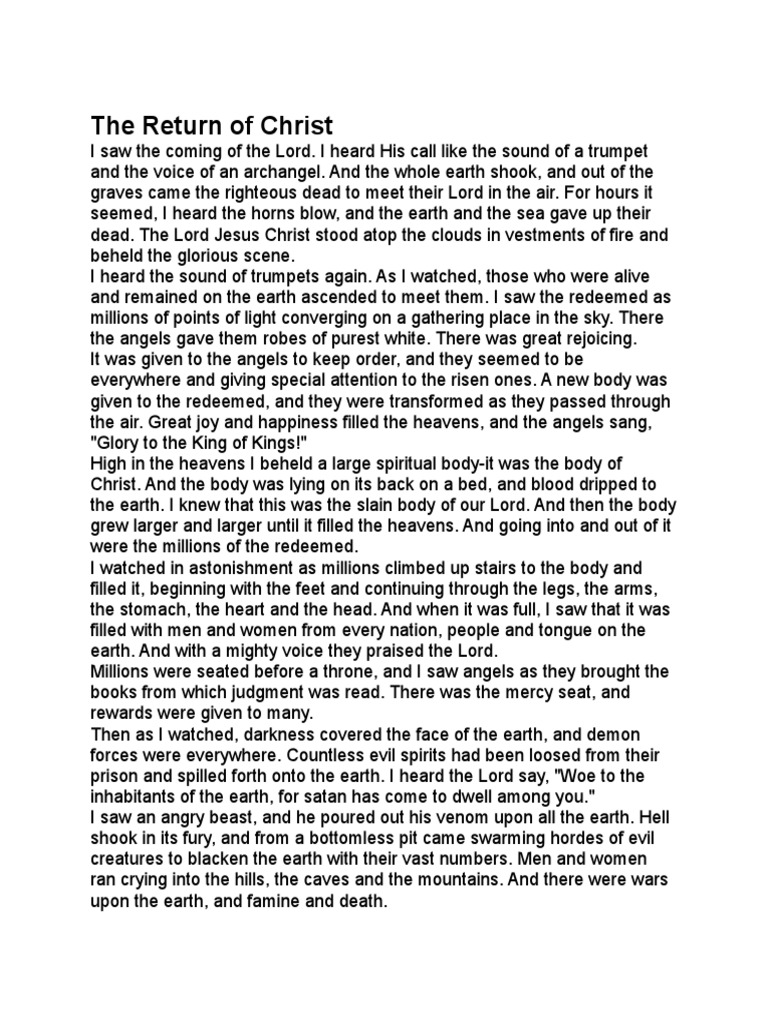In contemporary discourse surrounding spirituality, the concept of the Return of Christ garners substantial attention and intrigue. Such fascination can be traced to both scriptural interpretations and diverse theological perspectives. This article aims to elucidate the Bahá’í understanding of the Return of Christ, exploring its implications and addressing common observations regarding this profound topic.
At the heart of Bahá’í teachings lies the conviction that the Return of Christ does not imply a singular, physical manifestation of Jesus as often envisioned by traditional Christian doctrine. Instead, it is posited within the framework of prophetic fulfillment, elucidated through the lens of Bahá’u’lláh, the Founder of the Bahá’í Faith. He is believed to be the very embodiment of the awaited return, heralding a new epoch in spiritual development and social reform.
For many adherents of Bahá’í, the assertion that Jesus Christ has returned may appear audacious, prompting skepticism and contemplative inquiry. Such a stance challenges conventional notions of messianic prophecies predicated on physical appearances or miraculous events. Rather, Bahá’í teachings advocate a more metaphorical and inclusive interpretation that transcends narrow paradigms.
The notion of the Return not only serves as a theological anchor but also as a catalyst for engaging with contemporary social and moral dilemmas. Bahá’u’lláh proclaims that divine revelation is an ongoing process, continuously unfolding in alignment with the evolving needs of humanity. This concept inherently invites inquiry into the transformative power of faith and its capacity to instigate positive societal change.
To comprehend the implications of this teaching fully, one must delve into the significance attributed to prophetic messages throughout history. Each religious dispensation, from Moses to Muhammad and ultimately to Bahá’u’lláh, is regarded as a distinct chapter in the divine narrative, contributing uniquely to the spiritual edifice of mankind. Each Revelation addresses the contextual needs and challenges of its time. Consequently, the Bahá’í perspective seeks to integrate these teachings into a syncretic understanding of spiritual truth.
One of the profound observations in this discourse is the pervasive anticipation around the Second Coming of Christ. This anticipation often reflects underlying human desires—hope for redemption, repose in divine justice, and a unified global community. Such aspirations resonate with Bahá’í principles, which emphasize the oneness of humanity and the necessity for unity in diversity. This recurring theme forms a cornerstone in the Bahá’í understanding of prophetic fulfillment, wherein the message of Bahá’u’lláh resonates universally, fostering unity and progress.
Another salient factor fueling fascination is the intersection of prophecy and history. The Bahá’í teachings suggest that significant events in the 19th century—both sociopolitical and spiritual—serve as a backdrop to the advent of Bahá’u’lláh. The disintegration of established orders and the birth of new societal paradigms create an environment ripe for prophetic fulfillment. This historical lens invites deeper contemplation regarding humanity’s path and the vital role of divine guidance in navigating tumultuous times.
Additionally, the Bahá’í concept of the “Return” encapsulates a deliberate invitation for individuals to examine their relationship with the divine more holistically. Rather than awaiting a distant savior, adherents are encouraged to cultivate an active engagement with their faith, striving for personal and communal transformation. The collective responsibilities laid upon believers underscore the imperative to translate spiritual insights into actionable social change—a hallmark of Bahá’í philosophy.
Central to this philosophy is the recognition of the inherent value of every soul. Bahá’u’lláh propounds that the manifestation of divinity is not confined to historical figures but resides within each individual. This democratization of spirituality posits that every person has the potential to reflect divine attributes, thereby instigating a transformative impact on society. This perspective invites a paradigm shift from passivity to an engaged and active embodiment of faith in daily life.
The contemplative inquiry surrounding the Return of Christ also invites discussion on the interplay between faith and reason. The Bahá’í teachings advocate for a harmonious relationship between the two, emphasizing that true belief does not necessitate the rejection of intellectual exploration. Instead, faith is seen as a dynamic interplay with reason—a conversation that allows for a deeper understanding of divine wisdom as manifested through various religious traditions.
In conclusion, the question, “Did You Miss the Return of Christ?” serves not merely as a query about historical events but also as a prompting reflection on one’s spiritual journey and the collective human experience. The Bahá’í teachings illuminate a path that embraces both the immediacy of the present and the historical continuum of divine revelations, offering an enriched perspective on spirituality. The engagement with this topic encourages ongoing dialogue about belief, unity, and the ever-present possibility of transformation and redemption. Ultimately, the principles enunciated by Bahá’u’lláh resonate as clarion calls for a collective awakening—a reminder that the Divine is continuously calling humanity to higher realms of consciousness and action.
